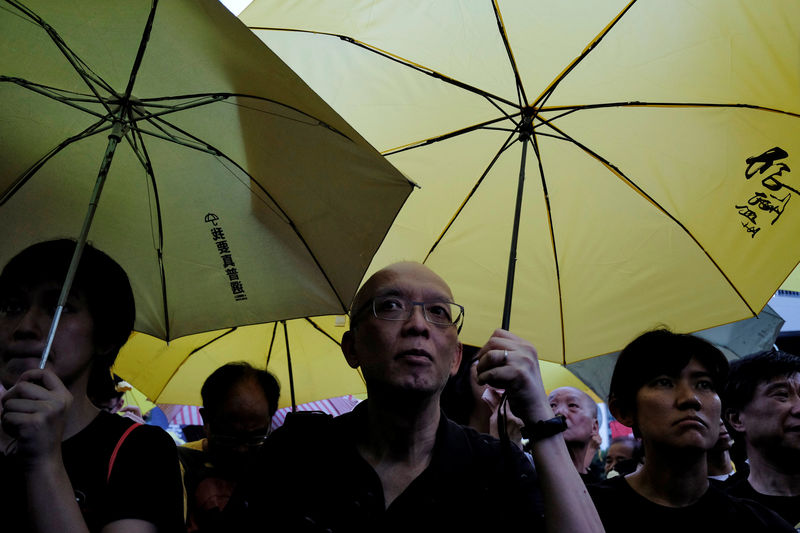By Venus Wu
HONG KONG (Reuters) - Hundreds of protesters in Hong Kong on Thursday demanded full democracy outside government headquarters, speaking out against China's suppression of civil liberties on the third anniversary of a major pro-democracy movement.
Unfurling a mass of yellow umbrellas, a symbol of the 2014 movement that blocked major roads in the financial hub for close to three months, the demonstrators gathered at the same spot where police fired tear gas on the crowds three years ago.
The 2014 Hong Kong protests were considered one of the boldest populist challenges to China's Communist Party rulers since the 1989 pro-democracy protests in and around Beijing's Tiananmen Square (NYSE:SQ).
"We have no fear," the protesters shouted as police looked on. "We want universal suffrage."
The former British colony returned to Chinese rule in 1997 with the promise of a high degree of autonomy under a so-called "one country, two systems" arrangement.
But frustration over China's tightening grip on Hong Kong's civil liberties was a key factor fuelling the 2014 movement, which was forcibly disbanded by police with no concessions granted by Hong Kong or Chinese authorities.
Three years on, many of the youth-led movement's leaders are either behind bars or bracing for jail time on charges such as unlawful assembly.
"We need to adjust our mentality," said Benny Tai, a law professor at the University of Hong Kong and one of the leaders of the 2014 protests. "We're not scared. If you want to throw us in prison, do it!"
Joshua Wong, aged 17 when he helped lead the movement, and now in jail for unlawful assembly, said Hong Kong was becoming increasingly suppressed, with an estimated 100 activists, most of them young, embroiled in legal proceedings.
"As Hong Kong ushers in a heightened authoritarian era, to advocate human rights is to risk becoming a political detainee. This is the new normal," Wong wrote in a column published in the Guardian newspaper on Thursday.
"One simply cannot turn a blind eye and kid oneself that Hong Kong is still the same as it has always been."
An appeals court decision last month to overrule a previous non-jail term and instead imprison Wong and two prominent student activists sparked an international outcry.
China's main representative "Liaison" office in Hong Kong couldn't be reached for comment, but Beijing has long stated it respects Hong Kong's "high degree of autonomy" and is supportive of lawful and gradual democratic development until universal suffrage is realized.

Political tension has also escalated over posters on university campuses advocating independence for Hong Kong, angering Chinese officials who consider the territory an "inalienable" part of China, and sparking heated standoffs between students and pro-Beijing supporters.